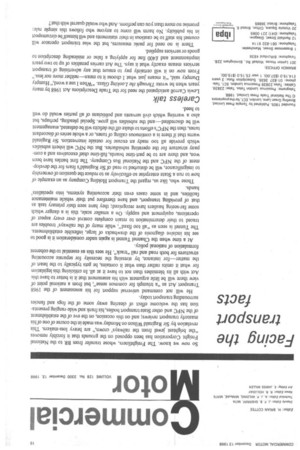Facing the transport facts
Page 21

If you've noticed an error in this article please click here to report it so we can fix it.
So now we know. The Freightliners, whose transfer from BR to the National Freight Corporation has been opposed on the grounds that it forcibly removes "the brightest jewel from the railways' crown," are heavy loss-makers. This revelation by Sir Reginald Wilson on Monday was made in the course of one of his masterly transport reviews; and on this occasion, on the eve of the establishment of the NFC and other State transport bodies, his frank and wide-ranging presentation has the welcome effect of clearing away some of the fogs and fancies surrounding transport today.
He will not command universal support for his assessment of the 1968 Transport Act as "a triumph for common sense", but from a national point of view there will be little argument with his assessment that it is better to have this Act with all its blemishes than not to have it at all. In criticizing this legislation for what it omits rather than what it contains, he gets typically to the heart of the matter—for instance, by stressing the necessity for separate accounting structures for both road and rail "track". He sees this as essential to the coherent formulation of national policy.
At a time when the Channel Tunnel is again under consideration it is good to see his incisive diagnosis of the drawbacks of large, inflexible establishments. The Tunnel is seen as "all too fixed", while many of the railways' troubles are traced to their determination to retain complete control over every aspect of operations, equipment and supply. On a smaller scale, this is a danger which some far-seeing hauliers have recognized; they have seen their primary task as that of providing transport, and have therefore put their vehicle maintenance facilities, and in some cases even their accounting systems, into specialists' hands.
Those who, like us, regard the Transport Holding Company as an example of how to run a State enterprise so effectively as to reduce the question of ownership to insignificance, will be disturbed to read of Sir Reginald's fears for the development of the NFC and the National Bus Company. The first battles have been won, and there are to be part-time boards, full-time chief executives and a company structure for the operating subsidiaries. But the NFC will inherit subsidies which provide all too ready an excuse for outside intervention. Sir Reginald warns that if there is a continuous calling of tunes, or a whole series of discordant tunes, then the NFC's efforts to shake off the deficits will be defeated, management will be discredited—and the subsidies will grow. Special pleading, perhaps, but also a warning which civil servants and politicians of all parties would do well to heed.
Careless talk
Lewis Carroll anticipated the need for the Trade Descriptions Act 1968 by many years when he wrote Through the Looking Glass. "When I use a word," Humpty Dumpty said, "it means just what I choose it to mean—neither more nor less." From now on it will certainly pay to ensure that any advertising of transport services means exactly what it says. The Act carries penalties of up to two years imprisonment and £400 fine for applying a false or misleading description to goods or services supplied.
There is no need for panic measures, but the wise transport operator will counsel his staff to be cautious in their statements and will himself be circumspect in his publicity. No harm will come to anyone who follows this simple rule: promise no more than you can perform. And who would quarrel with that? Founded 1905. Published by Temple Press Limited, Bowling Green Lane, London, EC1, fortheproprietars a The National Trade Press Limited, 1968.
Telegrams: Pressimus London Telex. Telex: 23839. Cables: Telex 23839 Pressimus London, Ed. Telephone: 01-837 3636. Subscription Rate: 3 years £14.15.0 ($37.00). 1 year £5.15.0 ($15.00).
BRANCH OFFICES: 301 Lynton House. Walsall Rd., Birmingham 228. Telephone: BIRchfield 4838 1 Brazennose Street, Manchester. Telephone: 061-832 6114 12 Renfield Street. Glasgow. Telephone: (041) 221 0065 20 Victoria Square, Clifton, Bristol 8 Telephone: Bristol 36865












































































































